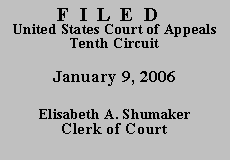

| RICARDO K. GONZALES, |
|
| v. | |
| MARK CREMIN, Chief, Defense Appellate Division; U.S. ARMY LEGAL SERVICES AGENCY; UNITED STATES OF AMERICA, |
Gonzales chose not to appeal under Article 66, where he would have been entitled to a lawyer, and instead to seek review in the office of the Judge Advocate General under Article 69. Contending that the denial of military defense counsel in a proceeding under Article 69 violates the Sixth Amendment, Gonzales filed this pro se action in federal district court. In his initial complaint, he sued for damages for violation of his Sixth Amendment right to counsel. Recognizing that this complaint would likely be dismissed under the Feres doctrine, which bars complaints for damages by members of the military for constitutional and other violations that occur in connection with their military service, Tootle v. USDB Commandant, 390 F.3d 1280, 1281 (10th Cir. 2004), see Feres v. United States, 340 U.S. 135 (1950), Gonzales sought to amend his complaint to seek mandamus or injunctive relief ordering Defendant Michael Cremin, Chief of the Defense Appellate Division, to provide military defense appellate counsel for his Article 69 proceeding.
The district court denied the motion to amend on the ground that "another judge in this district has already considered habeas and mandamus requests by plaintiff for court orders addressing alleged constitutional error in plaintiff's pending military proceeding." See Gonzales v. Judge Advocate General of the Army, Case No. 04-3453-RDR. The court in that case denied relief, and this Court affirmed. See Gonzales v. Judge Advocate General of the Army, No. 05-3264, 2005 WL 2398219 (10th Cir. Sept. 29, 2005). The district court also dismissed the action for damages under the Feres doctrine, a ruling Gonzales does not appeal.
Multiple reasons support affirmance of the district court. On the merits, the UCMJ does not provide for military defense counsel in Article 69 proceedings, and appellant cites no authority that such counsel is constitutionally required. A service member convicted by court-martial is entitled to appeal under Article 66, where appellate counsel is provided. The Sixth Amendment does not compel appointment of counsel for other forms of military review. Moreover, the appropriate vehicle for requesting counsel is to file a motion for appointment of counsel in the proceeding where counsel would be involved. In the event that motion is denied, and the movant wishes to obtain review of the constitutionality of that denial, the proper course is to take an appeal or to seek administrative or subsequent habeas review. It is not to proceed to a different court and ask that court to order appointment of counsel.
The judgment of the United States District Court for the District of Kansas
is AFFIRMED.
Entered for the Court,
Michael W. McConnell
Circuit Judge
*.After examining the briefs and appellate record, this panel has determined unanimously that oral argument would not materially assist in the determination of this appeal. See Fed. R. App. P. 34(a)(2); 10th Cir. R. 34.1(G). This case is therefore submitted without oral argument. This order and judgment is not binding precedent, except under the doctrines of law of the case, res judicata, and collateral estoppel. The court generally disfavors the citation of orders and judgments; nevertheless, an order and judgment may be cited under the terms and conditions of 10th Cir. R. 36.3.